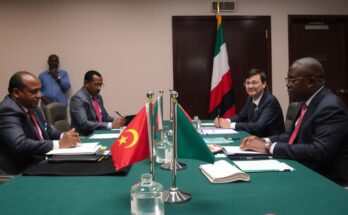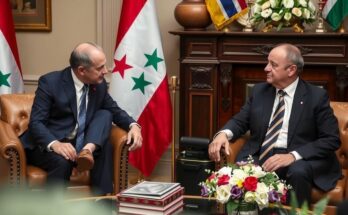Leaders of the G20 summit called for ceasefires in Gaza and Lebanon, stressing the need to tackle poverty and climate change. Brazilian President Lula da Silva emphasized that these issues are politically driven, while the summit also addresses the ongoing conflict in Ukraine. A significant initiative against poverty received broad support, although Argentina expressed dissent. Finally, climate commitments were made, with calls for increased financing before the next COP summit.
Leaders of the G20 countries convened recently in Rio de Janeiro, calling for comprehensive ceasefires in Gaza and Lebanon amid rising geopolitical tensions. The summit highlighted key global issues such as climate change, poverty eradication, and equitable taxation of the ultra-rich. Brazilian President Luiz Inacio Lula da Silva emphasized that poverty and hunger stem from political choices, advocating for international cooperation to address these pressing challenges. On the summit’s first day, discussions were largely influenced by the ongoing conflict in Ukraine, where the U.S. recently permitted Kyiv to strike Russian territory with supplied long-range missiles. Consequently, G20 leaders, in their final declaration, cautiously welcomed initiatives promoting peace in Ukraine while condemning territorial aggression without specifically mentioning Russia. The declaration underscored the urgent humanitarian crisis in Gaza and called for an end to hostilities, paralleling a U.S.-proposed UN resolution for the release of hostages held by Hamas. Similarly, the G20 acknowledged the need for a ceasefire in Lebanon, allowing citizens to safely return home across the Blue Line separating Lebanon from Israel. Lula also launched a significant initiative to combat poverty and hunger, now endorsed by eighty-one nations, including eighteen of the nineteen G20 members. This measures the strong international alliance toward social justice and economic fairness, amidst noted dissent from Argentina’s new right-wing administration. Furthermore, while addressing climate change, the G20 did not achieve significant advancements in their final assertion, though they acknowledged the necessity for increasing climate financing substantially. Thus, the leaders agreed to establish a financial target by the conclusion of the upcoming COP29 summit in Azerbaijan.
The Group of 20 (G20) represents the world’s major economies, convening leaders to discuss pressing global issues that affect economic stability and international relations. The latest summit was overshadowed by heightened tensions surrounding the conflicts in Gaza and Ukraine, leading to pointed calls for ceasefires. In addition to addressing regional conflicts, the summit focused on worldwide issues such as poverty, climate change, and equitable taxation, reflecting the interconnectedness of economic and humanitarian challenges. Brazil, under President Lula da Silva’s leadership, emphasized socio-economic inequalities, merging calls for aid against hunger with climate efforts, thus reiterating the critical need for global cooperation and responsible governance.
In summary, the G20 summit in Brazil marked a significant diplomatic effort to address urgent global challenges, specifically calling for ceasefires in Gaza and Lebanon while underscoring the intersections of poverty and climate change. President Lula’s commitment to tackling systemic poverty and the group’s cautious stance on Ukraine highlighted the complexities of international relations today. While the leaders acknowledged the vital need for climate financing, specifics remain to be defined, thus maintaining the imperative of ongoing dialogue and collaborative action to address pressing global issues.
Original Source: www.aljazeera.com




